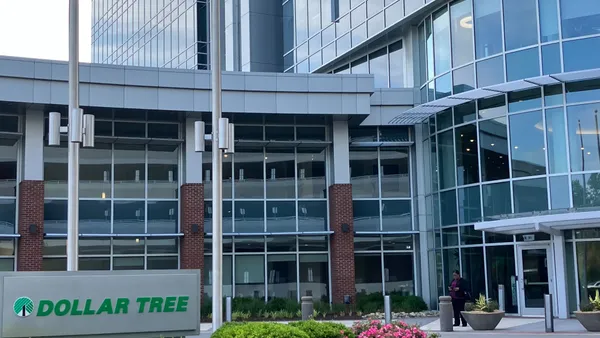Dive Brief:
- Outdoor apparel and accessories brand Cotopaxi successfully completed a remediation initiative after discovering that a tier 1 supplier had unethical recruiting practices, according to the company’s 2023 Impact Report released April 18.
- A routine third-party audit in 2022 found potentially predatory recruitment practices through a third-party agency, pre-employment medical appointments not covered by suppliers, limited access to bathrooms, some partially blocked exits and a need for additional fire suppressants.
- Because the supplier’s infractions did not involve abuses such as slave or child labor, Cotopaxi chose remediation over removal, Annie Agle, VP of impact and sustainability, said in an email. “We believe in working with suppliers to uplift worker populations and progress regarding their social and environmental sustainability,” she said.
Dive Insight:
In the 2022 case, the “most troubling” infraction was the “potentially coercive recruitment practices,” according to a 2022 Impact Report. Agle noted that the supplier is located in the Philippines, and that those recruitment practices arose due to pandemic-driven labor shortages in the region.
To resolve these violations, Cotopaxi joined a working group alongside two other brands that used the same supplier, per the 2023 report. Together, the companies tapped Elevate, a third-party audit and remediation consultancy to help the supplier remediate risks and damages. Cotopaxi financially supported all of the remediations and re-audits, and will provide an in-depth report on the improvements.
Cotopaxi was able to assure that the supplier’s third-party recruitment agency in question was not using predatory or debt-bondage tactics, per the report. Health and safety issues were also resolved, and did not reappear in a follow-up audit. Going forward, Cotopaxi has a standing meeting every week with the supplier to ensure the fixes are maintained and improved over time.
“Cotopaxi’s most significant (salient) risks to others occur within its supply chain. As a textile and apparel company, Cotopaxi remains vigilant about counteracting the risk of human rights abuses, such as child labor, forced labor, harassment and discrimination, additional hours, and significant environmental impacts across our value chain,” the company said in its Impact Report.
Utah-based Cotopaxi centers its brand on ethical and sustainable production as a certified B corporation, which means that the company has met a series of standards and implements a set of policies geared toward social and environmental causes. In turn, Cotopaxi regularly conducts third-party audits to gauge sustainability performances across its tier 1 and tier 2 suppliers, according to the report.
Along with third-party audits, Cotopaxi also uses anonymous surveys and reporting mechanisms, site visits, and egalitarian calls with supplier managers as tools to mitigate abuses. Although negative findings have decreased, they can still occur.
In the audit process, suppliers sometimes end up being removed from the supply chain due to their violations. For instance, since 2009 Apple has cut ties with 25 manufacturing supplier facilities and 231 suppliers over infractions of the company’s conflict mineral policies. However, Apple said it considers that type of termination “as a last resort.” Cotopaxi has a similar view.
“We feel strongly that it is irresponsible and morally wrong to cut ties with a supplier after negative audit findings. This has been proven to exacerbate impacts upon workers and frequently leads to additional abuses such as delayed wages and untimely layoffs,” Agle said.













